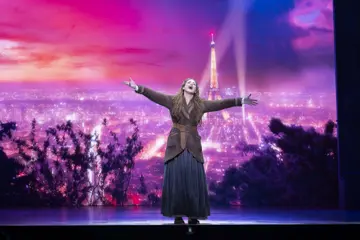The bigs are getting bigger
In the 2009 end of decade charts, the #1 album was Delta Goodrem’s Innocent Eyes, which came in at 14 times platinum (70,000 units), or a shade under one million units shifted. By the end of last decade, Adele held that respective top spot with the 17 times platinum accredited 21, which equates to just under 1.2 million units. The difference is even more pronounced in the singles category, obviously no doubt influenced by the revolution brought about by streaming this decade, allowing you the all-you-can-eat option as opposed to forking out for individual tracks. The highest accredited track was Lady Gaga’s Poker Face at 6 times platinum (yet it only finished the decade as the #4 track, go figure). Yet by 2019’s end, only 12 tracks in the entire top 100 singles were accredited as 5 times platinum or less. Up the pointy end we’re looking at accreditations in the teens, with Ed Sheeran's Shape Of You in the #1 slot and having 14 times platinum (yet again, a track with higher accreditation - Mark Ronson and Bruno Mars’ Uptown Funk was 17 times platinum - managed lower down at #3). It seems like the system for judging singles is akin to cricket’s little understood Duckworth-Lewis-Stern method for calculating target scores in abridged matches.
The old reality TV ain’t what she used to be
Reality music television has lost its lustre over the decade. Australian Idol was a phenomenon when it started. Its first final in 2003 had 3.3 million viewers, and ended up being the biggest non-sports show of the year. At the time this reflected through to music sales as well, as the 2009 end of decade charts show. Three of the top five singles were from Idol alumni, including the #1 and #2 slots from Guy Sebastian and Anthony Callea respectively. By 2009 though, the show had been cancelled and the others that followed in its wake (The X Factor, The Voice, Australia’s Got Talent) never gave the careers of its participants the boost that Idol did. As for the decade just gone? Well, props to Guy Sebastian for one for getting another track in the following decade's top 100 (albeit at #19), but you’re scraping the bottom of the barrel to find any reality TV links, and Australian ones are practically non-existent. You’ll only find Matt Corby on there at #68, who was on Idol but it didn’t give his career the instant boost as it did Sebastian, Callea, Shannon Noll et al, and he usually tries to keep it on the quiet (sorry for bringing it up again Matt). Other reality TV links are not even Aussie and include James Arthur at #38 and One Direction at #81 (from the UK’s X Factor) and Calum Scott at #66 (From Britain’s Got Talent).
You don’t care about Aus
While there has long been complaints about the paucity of Australian acts in the singles charts, the end of decade charts sadly reflect this as an increasing trend. The 2009 end of decade singles charts saw a mere 16 Aussie tracks in the top 100, by the end of 2019, the decade's figure was a mere 13 locals. Mind you, shout out to Gotye for smashing it this decade as his track featuring Kimbra, Somebody That I Used To Know, was the #2 song from the teens according to ARIA, but without the Australian Idol-assisted boost, there weren’t that many others up the pointy end. Volume-wise Aussies fared better in the albums charts, yet alas again it was a downward trend. 2009’s end of decade charts saw just over a quarter of Australian artists represent (26), whereas in the ten years just gone, that has dropped to one-fifth and only 20 acts. And things get worse from there, which leads us to...
Out with the new, in with the old
Do we care about new music anymore? It seems like the prevailing trend is we can only take it in small doses these days. If we want a bigger hit of tunes, it seems like we’re not looking for a bunch of new ones altogether, we want some old faves, thank you very much. The end of decade singles charts reflect the fact that they’re songs released throughout that preceding decade. Fair enough. The end of decade album charts however tell a very different story and show a change in our listening habits. The top 20 albums from 2009 decade’s end only featured two greatest hits albums (Robbie Williams at #9 and The Beatles at #20) and two albums of covers (Michael Buble and Susan Boyle). By the time we come to the end of 2019 though, that decade showed a vast change in how we consume albums looking at the same pointy end. The number of greatest hits had blown out to four (Pink, INXS, Bon Jovi, Cold Chisel), Michael Buble’s yuletide standards Christmas (which, like the ghost of Christmas past, haunts us every year on the charts) and the Frozen soundtrack (which, yes, is technically an album of original material, but not a new album by one particular artist).
Don't miss a beat with our FREE daily newsletter
And remember how I was saying things weren’t looking good for Aussie acts? Well the boxing kangaroo was flying proudly in the 2009 end of decade charts, with six of the top 20 albums from local acts (including, if you remember, Delta Goodrem at #1) - all of which were new albums of original material. A ten-year jump to the most recent end of decade charts though has shown that for whatever reason, we weren’t giving new Aussie music as much of a go. Only two Aussie acts made it into the top 20 albums, and they were both best ofs from INXS and Cold Chisel, with the former having been dormant since 2012. It’s not until #27 and Gotye’s Making Mirrors that you get a new studio album of original material by an Australian artist released in that decade. And remember how the top six Aussie albums of the noughties were all in the top 20? Um, well for the 2010s, those six are spread out to #47 - and only half are originals, with another best of (Crowded House) joining in. Despite a change in listening habits, some albums have amazing staying power though, with, for example, greatest hits from Fleetwood Mac, Red Hot Chili Peppers, Guns N’ Roses and Michael Jackson appearing in the end of decade album charts in both 2009 and 2019. Will they be there again in 2029? Yeeeeah, in the wake of Leaving Neverland probably not the latter, but let’s chat in a decade and see if we're still searching out Rhiannon or Sweet Child O' Mine, eh?















